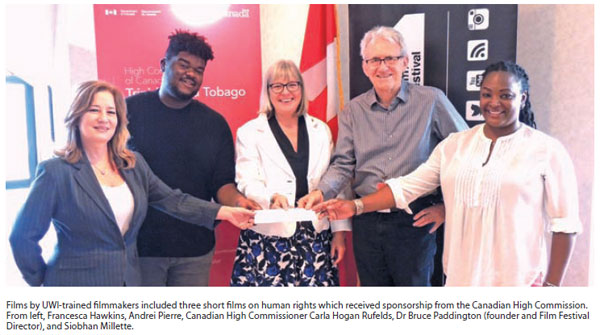|
October 2018

Issue Home >>
|

 This year’s trinidad+tobago film/18 festival (ttff/18) featured The UWI staff and alumni tackling social and economic issues behind and in front of the camera in nine films, ranging from shorts to full-length documentaries. Here we look at a few of them. This year’s trinidad+tobago film/18 festival (ttff/18) featured The UWI staff and alumni tackling social and economic issues behind and in front of the camera in nine films, ranging from shorts to full-length documentaries. Here we look at a few of them.
From Steelpan, the National Instrument to Steelpan, the Industry
Our very own Pro Vice-Chancellor and Campus Principal Professor Brian Copeland took to the silver screen in the documentary short, From Steelpan, the National Instrument to Steelpan, the Industry, directed by Ann-Marie Harry, retired drama and math teacher and founding member of the Pan in Schools Coordinating Council (PSCC). Speaking at the film premiere on Republic Day, September 24, Ann-Marie took the festival’s theme, “love film”, to heart, saying: “The film is intended to be a tool to inspire the young people and their parents to encourage them to get involved in the steelpan industry.” In his role as developer and patenter of the G-pan and P.H.I (Percussive Harmonic Instrument), Prof Copeland commended the film’s idea that teaching pan tuning as an examinable CVQ (Caribbean Vocational Qualification) subject in schools would be “an innovative way to diversify the economy and provide recognition for competencies in pan.”
Sun, Sea and Science: Trinidad after Oil
Another take on economic diversification was offered in the film Sun, Sea and Science: Trinidad after Oil, directed by Raymond Ramcharitar. This film examines the work of UWI lecturers microbiologist Dr Adesh Ramsubhag, computer scientist Prof Patrick Hosein, and medical researcher Prof Paul Teelucksingh, as alternatives to Trinidad’s economic dependency on oil. The documentary shows how the work of these three scientists, and others, as well as the organisation which brought them together, the Anthony N Sabga Caribbean Awards for Excellence, could create a path to economic salvation based on local knowledge and untapped sustainable resources. Raymond gave thanks to UWI Today as the first source of all the information featured in the film, and thanked the film’s production team, Pixelplay Media, especially Dion Boucaud, for helping the film come alive after years in the making.
The Deliverer
UWI alumnus and triple-threat writer, director and actor Paul Pryce saw UWI’s core values as inspiration for his short film, The Deliverer: “My film seeks to provoke a conversation around the issues of crime and political corruption and how these ills force ordinary men to make morally conflicting choices. One of UWI's core values is to bestow critical thinking skills onto the student and no matter what field you are in, from the arts to economics, one must always seek to question what we accept as truth for something greater."
Reel Human Rights films
At the Reel Human Rights Films Screening and Panel Discussion, three short films written and directed by UWI alumni looked at different issues surrounding LGBTQIA rights: Please See Attached by Andrei Pierre, I Choose You by Siobhan Millette and Judgment Day by Francesca Hawkins. The screening was part of a two-year partnership with the High Commission of Canada where 15 emerging filmmakers were mentored and competed in a scriptwriting workshop. Andrei, Siobhan and Francesca were selected as winners and given CAN$5,000 to go towards the production of their films.
Andrei saw the motivation behind his film Please See Attached as an opportunity to “Find that concept or angle that allows you to tell that story in a respectful manner that dignifies people that are not from your group, but at the same time is also entertaining.” His film used some sly, funny instances of T&T picong and humour to liven up a serious theme of job discrimination.
Reflecting on her experience, Siobhan felt the relationships she developed during her time at The UWI Film Programme enabled her to rely on some talented fellow filmmakers to make her film I Choose You, about a little boy’s hard choices, into a reality.
Meanwhile, the veteran journalist Francesca Hawkins, who was among the earliest of UWI’s film studies graduates, applied her sharp eye, narrative talent and sensitive visual storytelling to create a powerful short black and white documentary about a day in the life of Jason Jones in his legal challenge of the Sexual Offences Act, a relic of colonial era laws that criminalise sexual relations between consenting adults of the same sex. Her short film Judgment Day weaves a dramatic tapestry of many different, often vehemently opposing voices on the issue of LGBTQIA rights in Trinidad, all converging on the one day when a landmark historic judgment is made at the Hall of Justice.
Perhaps Dr Jerome Teelucksingh, UWI History Lecturer and founder of International Men’s Day, summed it up best at his own documentary screening of International Men’s Day: “When making a film, choose a topic that will benefit in some way. Right now, we need to have movies that are more conscious that deal with pressing issues. We need to produce films that offer solutions and show a different perspective and even have the potential to develop sequels.” |





